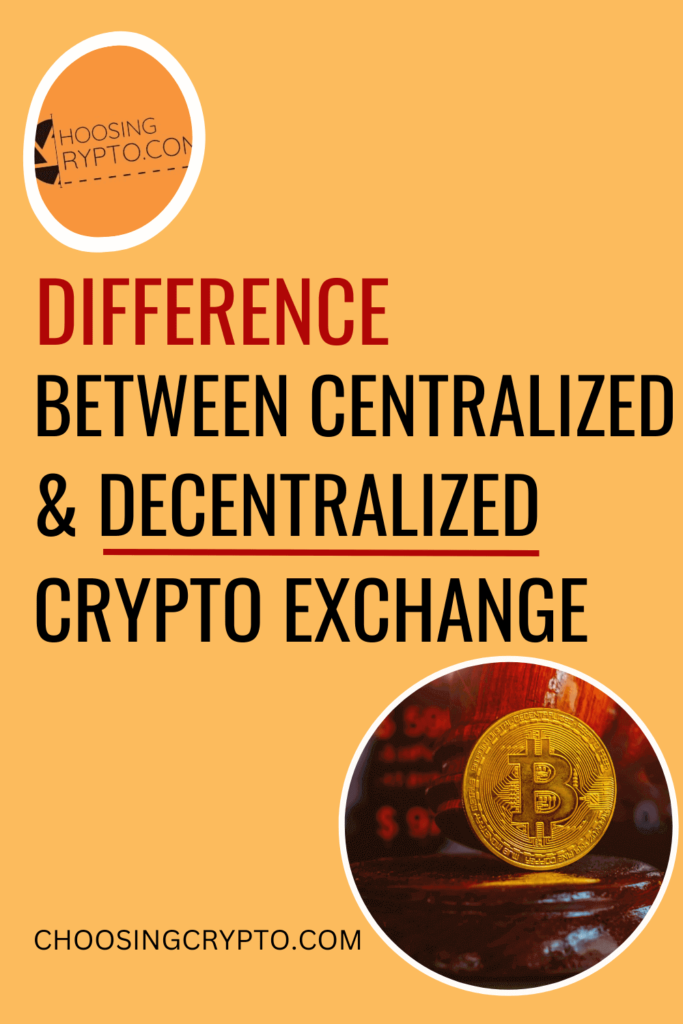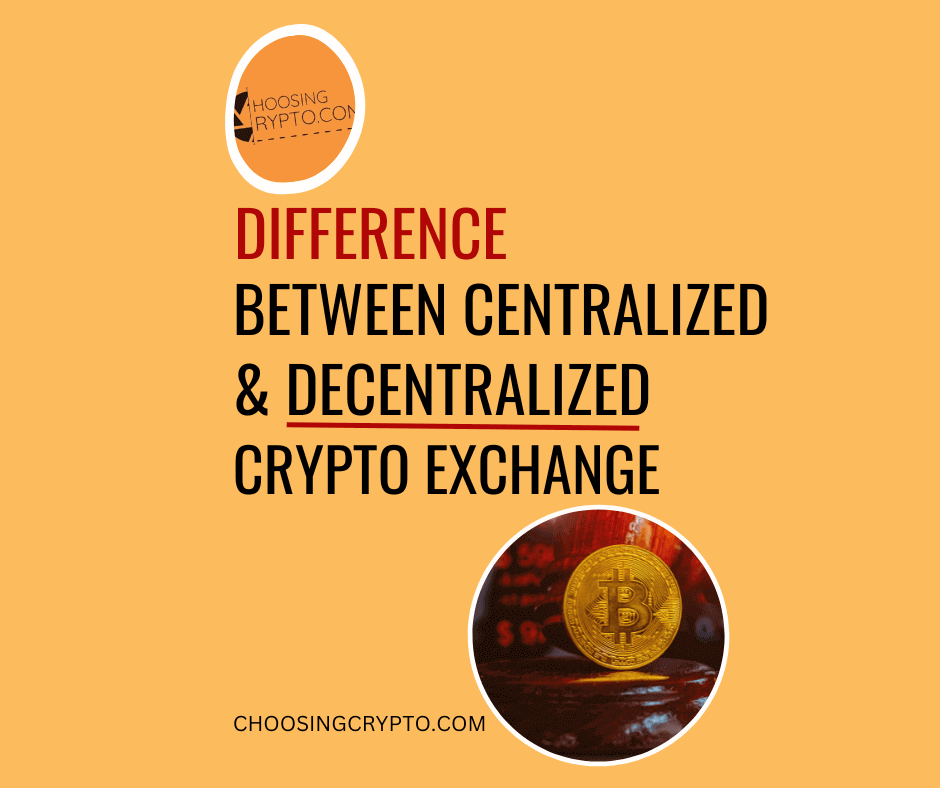If you’ve ever wondered about the difference between centralized and decentralized crypto exchange and what sets them apart, you’re in the right place.
In this blog post, I’ll break down the walls surrounding these exchange types and guide you through the twists and turns of their functionalities, security, and overall user experience.
You’ll soon discover that the choice between centralized and decentralized crypto exchange can have a profound impact on your crypto journey.
But before we dive headfirst into the details, let’s take a moment to consider what makes a captivating exchange experience.
It’s not just about buying and selling; it’s about feeling secure, empowered, and inspired to take action.
Because, all exchanges are not created equal, and understanding the differences between centralized and decentralized crypto exchange is crucial for anyone venturing into the crypto space.
So, grab your favorite beverage, find a cozy spot, and get ready to unlock the secrets of centralized and decentralized crypto exchanges.
By the end of this guide, you’ll have the knowledge and confidence to make the right decisions rather than following the crowd blindly.
What is a Centralized Crypto Exchange
A significant portion of the crypto landscape is dominated by centralized exchanges.
These exchanges operate on a traditional model, similar to financial institutions like banks.
They are operated by a central authority or company that facilitates the trading process and holds custody of users’ funds.
In other words, centralized exchanges act as intermediaries between buyers and sellers, executing trades on their behalf.
Centralized exchanges maintain control over the order matching, trade execution, and storage of user funds.
Key Features and Benefits of Centralized Crypto Exchanges
Centralized exchanges offer several advantages that have contributed to their widespread adoption:
1. User-friendly interface and accessibility
Centralized exchanges typically provide user-friendly interfaces, making it easier for beginners to navigate and engage in trading activities.
They often offer a range of trading pairs and advanced order types.
2. Liquidity and trading volume
Centralized crypto exchanges generally have higher liquidity and trading volumes compared to decentralized exchanges.
This ensures that users can execute trades quickly and efficiently, even for large orders.
3. Order matching and execution
Centralized exchanges employ sophisticated order-matching algorithms to match buy and sell orders, ensuring efficient execution.
They provide market, limit, and stop orders, allowing users to control the price at which they want to buy or sell crypto.
4. Customer support and security measures
Centralized exchanges often have dedicated customer support teams to address user queries and concerns promptly.
They also implement robust security measures such as two-factor authentication, encryption, and cold storage to safeguard user funds.
Limitations and Concerns of Centralized Crypto Exchanges
While centralized exchanges offer convenience and accessibility, they are not without limitations and concerns:
1. Single point of failure and vulnerability
Since centralized crypto exchanges rely on a central authority, they are susceptible to single points of failure.
If the exchange experiences technical issues, hacking attempts, or regulatory actions, users’ funds and access to trading can be jeopardized.
2. Dependence on third-party intermediaries
Centralized exchanges require users to trust the exchange with the custody of their funds.
This reliance on a third party introduces counterparty risk, as users do not have direct control over their assets and are subject to the exchange’s terms and conditions.
3. Potential for Censorship
As centralized exchanges are subject to regulations, they may have to comply with requests for freezing or seizing assets.
This introduces the potential for censorship and limited financial freedom.
4. Data privacy and security risks
Centralized cryptocurrency exchanges collect and store user data, which can be vulnerable to data breaches and misuse.
Users must trust the exchange’s ability to protect their personal information.
Top Centralized Crypto Exchanges
Some of the most well-known centralized exchanges in the cryptocurrency industry include:
These exchanges have gained popularity due to their user-friendly interfaces, extensive trading options, and robust security measures.
[READ: How to Become Successful in Crypto Market]
What is Decentralized Crypto Exchange
Unlike centralized exchanges, decentralized crypto exchanges (DEXs) are built on blockchain networks, allowing users to trade cryptocurrencies directly with one another without relying on a central authority.
Smart contracts govern the order-matching and settlement processes, ensuring transparency and security.
Key Features and Benefits of Decentralized Crypto Exchanges
Decentralized crypto exchange offer several unique advantages that have attracted a growing user base:
1. Peer-to-peer trading and direct ownership
DEXs enable users to interact directly with each other, eliminating the need for intermediaries.
This peer-to-peer trading model promotes user autonomy and control over their funds, as they maintain ownership throughout the trading process.
2. Enhanced privacy and security
Decentralized crypto exchanges prioritize user privacy by not requiring users to disclose personal information.
Additionally, since users retain control of their private keys, the risk of hacking or theft from centralized exchange vulnerabilities is significantly reduced.
3. Elimination of central authority and censorship resistance
Decentralized crypto exchanges operate on distributed networks, removing the need for a central authority.
This censorship-resistant nature ensures that users can engage in trading activities without concerns of interference or restrictions from external entities.
4. Lower fees and potential for token interoperability
DEXs often have lower fees compared to centralized exchanges, as they eliminate the costs associated with intermediaries.
Additionally, decentralized exchanges promote token interoperability, allowing for seamless trading between different blockchain networks and assets.
Limitations and Challenges of Decentralized Crypto Exchanges
While decentralized crypto exchange offer compelling features, they also face certain limitations and challenges:
1. Lower liquidity and trading volume
Decentralized crypto exchanges have lower liquidity compared to centralized exchanges.
Since trading occurs directly between users, the available order book depth may be limited, resulting in potentially higher slippage and less favorable prices for large trades.
2. User experience and technical complexity
Decentralized crypto exchange often have a steeper learning curve and require users to have a basic understanding of blockchain technology.
The user interfaces of DEXs can be less intuitive compared to their centralized counterparts, making it more challenging for beginners to navigate.
3. Potential for scams and malicious activities
The decentralized nature of DEXs also opens up the possibility for malicious actors to create fraudulent projects or engage in illicit activities.
Users must exercise caution and conduct thorough research before participating in trading or interacting with unknown tokens or projects.
Examples of Decentralized Crypto Exchanges
Popular decentralized crypto exchanges include:
- Uniswap
- SushiSwap
- PancakeSwap
- Curve Finance
[READ: How To Choose a Good Crypto Exchange]
Comparison between Centralized and Decentralized Crypto Exchange
Centralized and decentralized crypto exchanges have distinct characteristics and cater to different user needs.
Key Differences in Structure and Operation:
1. Centralization vs. decentralization
The most fundamental difference lies in the presence or absence of a central authority.
Centralized exchanges rely on a central entity to facilitate trade, while decentralized crypto exchanges operate on distributed networks without a central authority.
2. Custody of funds
Centralized crypto exchanges require users to trust the exchange with the custody of their funds.
In contrast, decentralized exchanges enable users to retain control over their private keys and trade directly from their wallets.
3. Order matching and settlement
Centralized exchanges handle the order matching and settlement processes internally, whereas decentralized crypto exchanges utilize smart contracts to automatically execute trades between users.
4. Privacy and KYC requirements
Centralized exchanges often require users to undergo Know Your Customer (KYC) procedures, collecting personal information for regulatory compliance.
Decentralized cryptocurrency exchanges, on the other hand, typically do not require KYC and prioritize user privacy.
Factors to Consider When Choosing Between Centralized and Decentralized Exchanges
When deciding which type of exchange to use, several factors should be taken into account:
1. Security and privacy preferences
If you prioritize self-custody and enhanced privacy, decentralized crypto exchanges offer a more suitable option.
However, if you prefer the security measures and customer support provided by a centralized exchange, it may be a better fit for you.
2. Trading volume and liquidity requirements
Centralized exchanges generally have higher trading volumes and liquidity, making them more suitable for high-frequency trading.
A decentralized crypto exchange may be sufficient for less-frequency trading.
3. User experience and technical expertise
Centralized exchanges often have more user-friendly interfaces, making them more accessible to beginners.
Decentralized crypto exchanges, on the other hand, require a basic understanding of blockchain technology and may be more suitable for users with technical expertise.
4. Regulatory compliance and jurisdictional considerations
Centralized exchanges are more likely to comply with regulatory requirements and may be preferable for users who prioritize operating within legal frameworks.
Decentralized crypto exchanges, being less regulated, offer more freedom but also carry potential regulatory risks.
Real-World Use Cases and Scenarios for Each Type of Exchange
1. Centralized exchanges: Centralized exchanges like Binance, Kucoin, Gate.io, and Bybit are commonly used by retail traders, institutional investors, and individuals seeking a user-friendly experience, high liquidity, and access to a wide range of trading pairs.
They are often favored for short-term trading, arbitrage opportunities, or accessing emerging assets.
2. Decentralized exchanges: Decentralized crypto exchanges are popular among users who value privacy, control over their funds, and participation in decentralized finance (DeFi) ecosystems.
They are ideal for long-term holders, enthusiasts of blockchain projects, and individuals seeking a more trustless and censorship-resistant trading experience.
Conclusion
Understanding the difference between centralized and decentralized crypto exchange is crucial for anyone looking to dive into cryptocurrencies.
While centralized exchanges offer convenience, liquidity, and a familiar trading environment, decentralized crypto exchanges bring forth unparalleled security, transparency, and control over your own assets.
Remember, centralized exchanges act as intermediaries, holding your funds and executing trades on your behalf.
They provide a user-friendly experience, making it easy for beginners to enter the crypto market.
Plus, you can often find a wide range of trading pairs and enjoy speedy transactions.
On the other hand, decentralized crypto exchanges empower you to take charge of your financial destiny.
They eliminate the need for intermediaries, allowing you to retain full control over your funds.
With decentralized crypto exchange, you become the sole custodian of your assets, ensuring that you are the master of your own destiny in the crypto space.
But, the choice between centralized and decentralized crypto exchanges boils down to your personal preferences and priorities.
I hope you found this post helpful.
I have also written some other crypto blog posts that will help you in your cryptocurrency journey.
Check them below.
You should also check us out on Twitter and Instagram to follow us and stay up-to-date with the industry.
read also:
- 5 Best Centralized Crypto Exchanges
- What is The Difference Between A Crypto Wallet and Crypto Exchange
- How to Start Trading Cryptocurrency Successfully
- 5 Most Common Crypto Scams and How to Avoid Them
- The Do’s and Don’ts of Investing in Cryptocurrency
- 7 Best Ways to Protect Your Cryptocurrencies

IMPORTANT; you must never send money to anyone you meet online asking to help you invest in cryptocurrency. They are scammers. Crypto is easy, and you can do it all by yourself.
DISCLAIMER:
The information presented here should not be used as the sole basis of any investment decisions, nor should it be construed as financial, tax, legal, or accounting advice. I will also advise that you invest in cryptocurrency only what you are comfortable living without, at least temporarily.
[READ: 15 Proven Tips to Follow Before You Buy Cryptocurrency]
